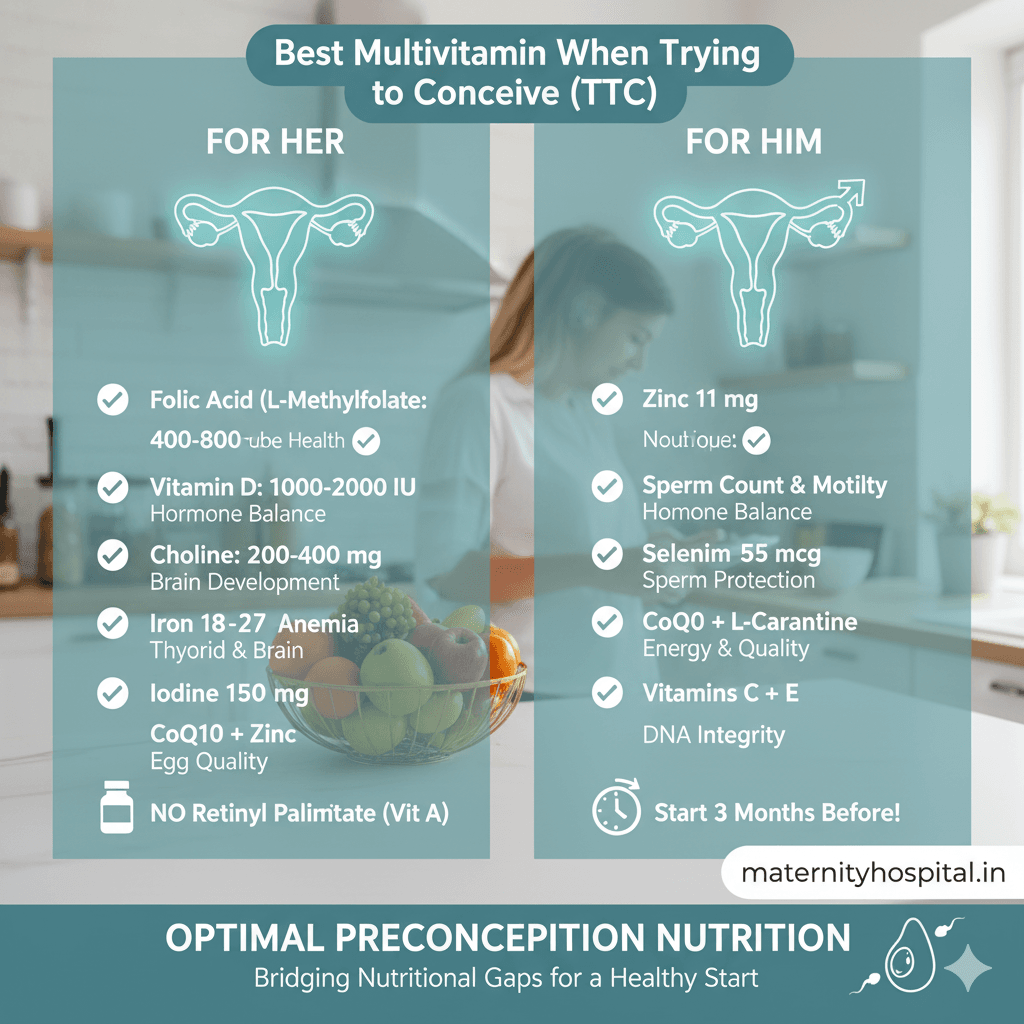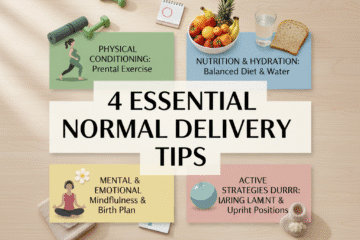
The BEST Multivitamin When Trying to Conceive (TTC): 3 Key Nutrients
Introduction –The Crucial Role of Preconception Nutrition
The decision to try to conceive (TTC) marks the beginning of a profound journey that requires preparation far beyond emotional readiness. Before a healthy pregnancy can begin, the body needs to build optimal nutritional stores to support the rapid development of the fetus in the earliest weeks—often before a woman even knows she is pregnant. Diet is fundamental, but even the healthiest eating habits can sometimes fall short in meeting the heightened demands for specific micronutrients required for conception and fetal development. This is where choosing the best multivitamin when trying to conceive becomes essential.
A high-quality preconception or prenatal multivitamin acts as an insurance policy, bridging the nutritional gaps and ensuring adequate levels of key vitamins and minerals. This proactive approach supports egg and sperm health, aids in the regulation of reproductive hormones, and, most importantly, provides the critical foundation necessary for preventing major birth defects. This article will guide you through the essential nutrients to look for, the critical dosages required, and how to select the best multivitamin when trying to conceive to optimize your health and pave the way for a successful pregnancy.
The Non-Negotiables –Folic Acid and Folate

The most vital and non-negotiable component of the best multivitamin when trying to conceive is Folic Acid (or its active form, Folate). Its importance stems from its role in preventing Neural Tube Defects (NTDs), such as spina bifida and anencephaly, which occur very early in pregnancy, typically within the first month after conception.
Key Requirements and Forms:
1. Dosage: Health organizations universally recommend that women who are TTC take a supplement containing 400-800 mcg (0.4-0.8 mg) of Folic Acid or Folate daily, starting at least one month prior to conception and continuing through the first trimester.
2. Folic Acid vs. Folate:
- Folic Acid is the synthetic form used in fortified foods and most standard supplements.
- Folate is the naturally occurring form found in foods.
- L-Methylfolate (or 5-MTHF) is the biologically active form. For individuals with the common MTHFR gene variation, the body has difficulty converting Folic Acid into its active form. Therefore, a multivitamin containing L-Methylfolate may be the best multivitamin when trying to conceive to ensure proper absorption and utilization. Checking for this specific form is a crucial step in selecting a supplement.
Essential Vitaminsfor Reproductive Health
While Folic Acid often takes the spotlight, several other vitamins are crucial for both male and female fertility and should be present in the best multivitamin when trying to conceive:
- Vitamin D: Often referred to as the “sunshine vitamin,” Vitamin D plays a role in regulating the reproductive hormones (like estrogen and progesterone) and has been linked to improved ovarian reserve and implantation success. Many people are deficient, making supplementation necessary. Look for a dosage of 1,000 to 2,000 IU daily.
- B Vitamins (B6 and B12): These vitamins are essential for cell division, DNA synthesis, and managing homocysteine levels. High homocysteine levels have been associated with potential pregnancy complications. B6 also aids in hormone regulation. The best multivitamin when trying to conceive will include these B vitamins in their active or bioavailable forms.
- Choline: Choline is an essential nutrient vital for early brain development and NTD prevention, working synergistically with Folic Acid. While not always included in standard prenatals, its inclusion is a strong indicator of a superior, comprehensive formula. Aim for a supplement that provides at least 200-400 mg of Choline.
- Vitamin A (Caution): While necessary, excessive Vitamin A (specifically in the form of Retinyl Palmitate) can be teratogenic (cause birth defects). The best multivitamin when trying to conceive should only contain Vitamin A in the form of Beta-Carotene, which the body converts safely as needed.
Key Minerals and Antioxidantsfor Conception
Beyond vitamins, a successful preconception phase relies on a balanced intake of key minerals and potent antioxidants, which are critical for egg and sperm quality.
- Iron: Essential for preventing anemia, which can cause poor pregnancy outcomes and maternal fatigue. Iron needs increase significantly during pregnancy, so starting with sufficient stores is vital. Look for 18-27 mg of a gentle, easily absorbed Iron form (like iron bisglycinate).
- Iodine: Necessary for the mother’s thyroid function and the baby’s developing brain and nervous system. Deficiency can lead to developmental problems. The ideal multivitamin contains 150 mcg of Iodine.
- Zinc: A potent antioxidant crucial for sperm health (count, motility, and form) in men and for egg quality and hormone regulation in women.
- Selenium and CoQ10: Although often stand-alone supplements, when included in the best multivitamin when trying to conceive, these provide powerful antioxidant protection against oxidative stress—a major factor in poor egg and sperm quality.
The Male Role:Supplements for Sperm Health
It’s crucial to remember that the best results come from a two-person approach. Men also benefit from taking a dedicated preconception multivitamin, as it takes approximately 74 days to produce mature sperm. A male-specific multivitamin should be taken for at least three months prior to conception.
Key Nutrients for Male Fertility:
- Zinc and Selenium: Critical for sperm structure, count, and motility.
- L-Carnitine: An amino acid that plays a fundamental role in sperm metabolism and motility.
- Coenzyme Q10 (CoQ10): A powerful antioxidant that significantly improves sperm concentration and motility by reducing oxidative damage.
- Vitamin C and E: Help protect sperm DNA integrity from free radicals.
Choosing the best multivitamin when trying to conceive for men means finding a formula focused on these antioxidant and energy-boosting compounds to optimize sperm quality and increase the chances of a healthy conception.
How to Choose the Best Multivitamin:Practical Tips
Selecting the right supplement can be overwhelming. Follow these steps to narrow down your choice and ensure you are taking the best multivitamin when trying to conceive:
- Look for “Preconception” or “Prenatal”: Preconception or Prenatal formulas are specifically tailored to the higher nutrient needs of this phase. Avoid standard adult multivitamins.
- Check the Folic Acid Form: Prioritize multivitamins containing L-Methylfolate for optimal absorption, especially if you have unknown MTHFR variations.
- Confirm the Vitamin D and Iodine Dose: Ensure these critical nutrients are present at the recommended levels (1000-2000 IU of Vitamin D; 150 mcg of Iodine).
- Avoid Excessive Vitamin A: Verify that Vitamin A is supplied predominantly as Beta-Carotene.
- Consider Omega-3 (DHA/EPA): While not a vitamin, Omega-3 fatty acids (DHA/EPA) are essential for fetal brain development. While some multivitamins include it, often the dose is low. It may be easier to purchase a separate, high-quality DHA supplement to take alongside your multivitamin.
- Third-Party Testing: Choose brands that use third-party verification (e.g., USP or NSF certification) to ensure the contents match the label and are free from contaminants.
By taking a proactive, informed approach and starting a high-quality multivitamin at least three months before you start trying, you give your body the best nutritional foundation for a healthy pregnancy.
Frequently Asked Questions on best multivitamin when trying to conceive
Q1: When should I start taking a multivitamin when trying to conceive? A: You should start taking a high-quality preconception or prenatal multivitamin at least 1 to 3 months before you stop using birth control or start trying to conceive. This ensures your nutrient stores, especially Folic Acid, are at optimal levels to prevent early birth defects.
Q2: Can men take a multivitamin when trying to conceive? A: Yes, absolutely. Men should take a dedicated multivitamin for sperm health, focusing on antioxidants like Zinc, Selenium, and CoQ10, for at least three months before conception to improve sperm quality and motility.
Q3: Is Folic Acid the same as Folate? Which one is better? A: Folic Acid is the synthetic version, and Folate is the natural version. For the best multivitamin when trying to conceive, look for the active form, L-Methylfolate (or 5-MTHF), as it is readily absorbed by everyone, including those with the MTHFR gene variation.
Q4: Should I take a separate DHA supplement? A: Yes. While some multivitamins contain DHA, the dosage is often insufficient. It is generally recommended to take a separate, high-quality Omega-3 DHA/EPA supplement (aiming for at least 200-300 mg of DHA) alongside your multivitamin for optimal fetal brain and eye development.
ExternalsLinks
| Source Name | Nutrient/Topic | Official URL |
| Centers for Disease Control and Prevention (CDC) | Folic Acid Intake (The non-negotiable requirement) | https://www.cdc.gov/ncbddd/folicacid/about.html |
| American College of Obstetricians and Gynecologists (ACOG) | General Preconception Health & Supplement Guidance | https://www.acog.org/womens-health/faqs/how-to-prepare-for-pregnancy |
| National Institutes of Health (NIH) Office of Dietary Supplements | Vitamin D Fact Sheet (Dosage and Rationale) | https://ods.od.nih.gov/factsheets/VitaminD-HealthProfessional/ |
Conclusion: Building the Nutritional Foundation for Conception
The journey of trying to conceive (TTC) is a remarkable act of planning and hope, and optimal nutrition stands as its most fundamental pillar. By proactively seeking the best multivitamin when trying to conceive, you are making a powerful investment in the health of both the prospective mother and the future child.
This supplement is not just a collection of pills; it is an essential nutrient insurance policy that ensures your body possesses the robust stores necessary for the critical and rapid development that occurs in the earliest weeks of pregnancy. Remember to prioritize the non-negotiables: the active form of Folate (L-Methylfolate), adequate levels of Vitamin D and Iodine, and essential supportive nutrients like Choline.
For the best results, remember that preconception health is a team effort. Encourage the male partner to focus on antioxidants like Zinc and CoQ10 to maximize sperm quality. Start this nutritional regimen at least 90 days before you aim to conceive. By choosing a comprehensive, high-quality multivitamin, you eliminate guesswork, reduce nutritional stress, and step confidently onto your path toward parenthood with the strongest possible foundation.
Declaration and Medical Disclaimer
This article, “Essential Nutrients: Choosing the Best Multivitamin When Trying to Conceive (TTC),” is for informational purposes only. It is intended to provide general education about key nutrients and supplements during the preconception phase.
This information is not intended to be a substitute for professional medical advice, diagnosis, or treatment.
Always seek the advice of a qualified healthcare provider, such as a doctor, gynecologist, or certified fertility specialist, regarding any medical condition, dietary changes, or before starting any new supplement regimen, including preconception or prenatal vitamins. Individual nutrient needs vary greatly based on factors like age, diet, existing health conditions, and specific genetic variations (e.g., MTHFR).
The products and nutrient dosages mentioned are based on general health guidelines and clinical research, but they should be verified and approved by your personal healthcare team. Never disregard professional medical advice or delay in seeking it because of something you have read in this article.










